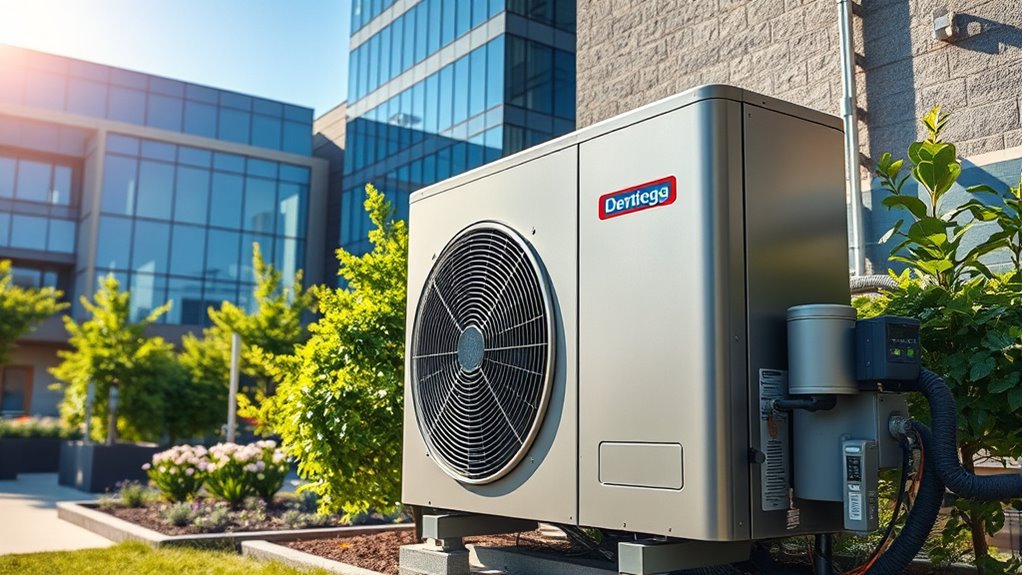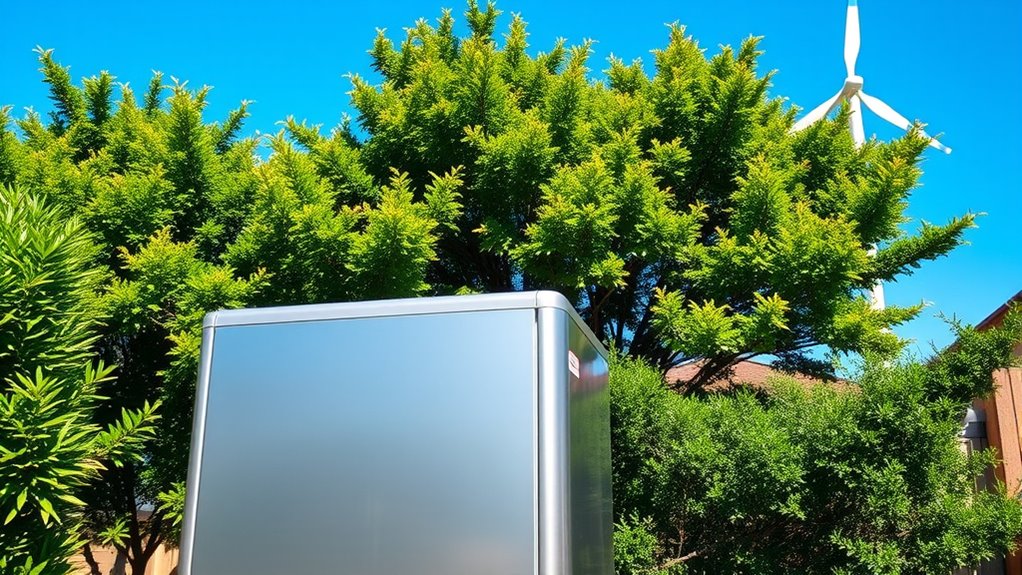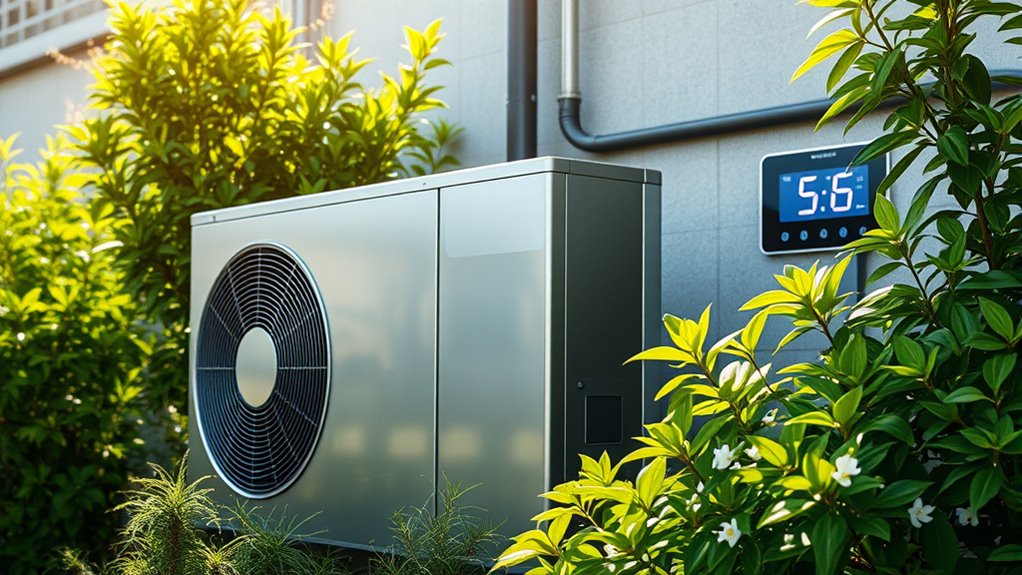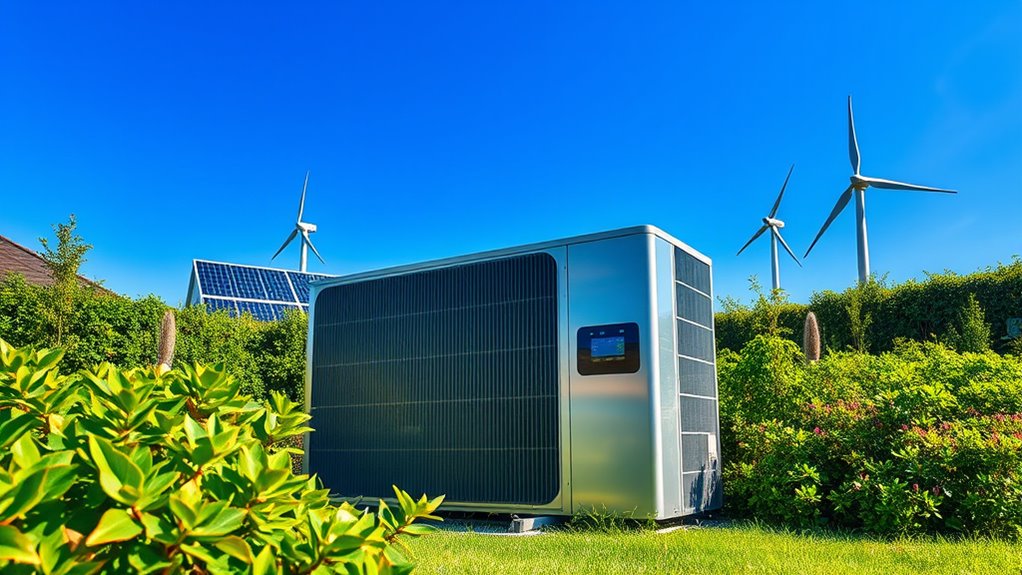Heat pumps support a greener energy future by replacing fossil fuel heaters with electric options powered by renewable energy. They markedly cut carbon emissions and improve energy efficiency, saving you money and reducing environmental impact. As adoption grows globally, technological advances and policy support will make them even more sustainable and affordable. Keep exploring to discover how heat pumps are shaping a cleaner, more efficient world for everyone.
Key Takeaways
- Heat pumps replace fossil fuel-based heating with electric systems powered by renewable energy, reducing carbon emissions.
- They operate with high efficiency, lowering energy consumption and supporting the integration of renewable sources like solar.
- Widespread adoption decreases reliance on natural gas, oil, and coal, contributing to global decarbonization efforts.
- Heat pumps enable sector coupling and smart grid integration, enhancing overall energy system sustainability.
- Their deployment accelerates progress toward climate goals by supporting cleaner, more efficient heating solutions worldwide.
The Growing Global Adoption of Heat Pumps

Have you noticed how heat pumps are increasingly becoming a common feature in homes worldwide? This surge reflects the rapid global adoption driven by their role in advancing renewable energy and improving energy efficiency. In 2021, heat pump sales rose nearly 15%, doubling their average growth over the past decade. China leads in new installations, while North America boasts the highest number of homes equipped with them. The worldwide capacity is expected to nearly double by 2030, supporting the shift toward cleaner building heating solutions. Europe’s deployment grew by about 35%, fueled by energy crises and policy incentives. As heat pumps become crucial to the energy transition, they help reduce carbon emissions and greenhouse gases, supporting district heating systems and emissions reduction efforts worldwide. Efficiency improvements in heat pump technology are also making them more accessible and cost-effective for consumers.
How Heat Pumps Reduce Carbon Emissions

Heat pumps substantially reduce carbon emissions by replacing fossil fuel-based heating systems with cleaner, electric alternatives powered increasingly by renewable energy sources. By supporting the shift to low carbon heating, heat pumps help reduce greenhouse gas emissions and lower your carbon footprint. They contribute to decarbonising heat in the global energy transition, which is essential for meeting climate goals. Using energy-efficient technology, heat pumps cut CO₂ emissions compared to natural gas, oil, and coal systems. Their widespread adoption aligns with national and international efforts to achieve sustainable energy solutions. As part of the move toward decarbonising heat, heat pumps enable cleaner, more efficient heating that supports a greener, healthier future for everyone. Incorporating natural elements into the home environment can also enhance the benefits of energy-efficient heating by promoting overall well-being and sustainability. Additionally, integrating renewable energy sources with heat pump systems can further amplify their environmental benefits and reduce reliance on fossil fuels. Moreover, advancements in smart grid technology facilitate more effective use of renewable energy in conjunction with heat pumps, maximizing their environmental impact. Furthermore, ongoing innovation in heat pump technology continues to improve efficiency and reduce the environmental footprint of these systems. Emphasizing energy storage solutions can also help balance supply and demand, making renewable-powered heat pumps even more sustainable.
Enhancing Energy Efficiency and Lowering Costs

By operating at efficiencies of 300 to 500%, heat pumps deliver two to four times more heating energy than the electricity they consume, making them highly effective and cost-efficient. Their high efficiencies reduce operational energy consumption and lower utility bills, supporting significant cost savings. When paired with renewable energy sources like solar, heat pumps further enhance energy savings and sustainability. Their ability to meet energy demand efficiently contributes to reducing costs and easing pressure on the grid, promoting grid stability. By decreasing overall energy consumption, heat pumps help lower greenhouse gas emissions while increasing energy efficiency. Additionally, their use of advanced technology ensures optimal performance and further reduces environmental impact. This combination of benefits makes heat pumps a smart choice for homeowners seeking to cut costs and support a cleaner, greener energy future. Furthermore, integrating heat pumps with smart grid systems can optimize energy use even more effectively. Modern heat pump systems also incorporate smart controls that adapt to usage patterns, further boosting efficiency and user comfort. Implementing demand response strategies can also enhance the integration of heat pumps into the energy system, leading to better resource management and stability.
Overcoming Challenges to Widespread Implementation

While heat pumps offer significant energy efficiency and cost savings, several obstacles hinder their broader adoption. Limited installation capacity due to a shortage of qualified installers and technical training slows market growth. Infrastructure limitations and outdated building regulations, especially in older or multi-family buildings, restrict scaling deployment. Insufficient policy incentives and inconsistent regulatory frameworks reduce economic appeal, while product supply chain issues challenge mass manufacturing. To address these barriers, coordinated efforts are essential. Additionally, increasing awareness of renewable energy innovations and technological advancements can help promote wider acceptance and integration of heat pumps into existing energy systems, including energy infrastructure upgrades. Recognizing the importance of reviews – toddler ride on toys can encourage more child-friendly, safety-conscious designs that align with sustainable development goals.
The Future Outlook for Heat Pumps and Sustainable Development

As the world accelerates its efforts to combat climate change, the future of heat pumps looks increasingly promising for sustainable development. Rapid heat pump deployment is vital to meet the 2030 capacity target of nearly 2,600 GW, more than doubling current levels. Technological innovation, such as high-temperature and hybrid systems, will expand applications to industrial processes and high-temperature heating, supporting decarbonization. Policy support, financial incentives, and sector coupling will drive widespread adoption aligned with climate goals. Integrating thermal energy storage, renewable energy, and smart grid solutions enhances energy efficiency and stability. These advancements guarantee heat pumps remain a cornerstone for sustainable development, helping us achieve decarbonization and a greener energy future.
Frequently Asked Questions
How Do Heat Pumps Help the Environment?
Heat pumps help the environment by cutting greenhouse gas emissions when you replace traditional fossil fuel systems. They improve air quality by reducing pollutants like particulates, SOx, and NOx. With high efficiency and low-GWP refrigerants, they lower your energy use and environmental impact. By adopting heat pumps, you support renewable energy and reduce reliance on fossil fuels, actively contributing to a healthier, greener planet.
Do Heat Pumps Really Save Energy?
You might wonder if heat pumps really save energy. The answer is yes; they are highly efficient, often producing 3 to 5 units of heat for every unit of electricity used. With COP ratings above 2.5, they outperform traditional systems. When properly installed and combined with renewable sources like solar, heat pumps appreciably cut your energy use, helping you save money and reduce your environmental impact.
Are Heat Pumps Greener?
You might think heat pumps aren’t that environmentally friendly, but they actually are. When powered by renewable electricity, they cut down carbon emissions markedly compared to traditional systems. Plus, they reduce air pollution and use eco-friendly refrigerants. By choosing a heat pump, you’re supporting cleaner air and a healthier planet, making your home both efficient and greener. It’s a smart, sustainable choice for a better future.
Why Are Heat Pumps the Future?
You might wonder why heat pumps are considered the future. They’re highly efficient, using 300-500% of energy, which cuts your energy bills and carbon footprint. With global capacity expected to nearly triple by 2030, they’ll supply more heating needs while reducing reliance on fossil fuels. Plus, government incentives and investments make them more accessible. Their ability to harness renewable and waste heat makes them a smart, sustainable choice for the planet’s future.
Conclusion
As you consider adopting heat pumps, remember their potential to transform your energy use and reduce emissions. For instance, imagine a family switching to a heat pump and cutting their carbon footprint considerably. This shift isn’t just about individual benefits but about contributing to a greener future. By embracing this technology, you become part of the solution, helping build a sustainable world where cleaner energy powers our lives and protects the planet for generations to come.









